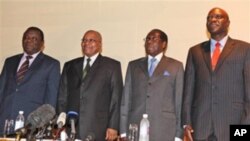Zimbabwe's power-sharing national unity government has probably spent as much time in crisis as it has solving the many problems facing the Southern African nation, but President Robert Mugabe's contention that it is not worth the trouble so new elections should be called next year is far from universally shared by Zimbabweans.
Mr. Mugabe told a meeting of his former ruling ZANU-PF party's youth league last week that sharing power with the rival Movement for Democratic Change formations of Prime Minister Morgan Tsvangirai and Deputy Prime Minister Arthur Mutambara has been too problematic and will have run its course in February 2011.
At that point the unity government based on the 2008 Global Political Agreement signed to resolve a stalemate in the country after failed elections in 2008 will have been in place for two years, its term under the GPA. The arrangement could be extended if its principals agree - but any one party to the GPA can call it off after two years.
The unity government is now facing its most severe test to date with relations between the president and the prime minister strained to the breaking point over Mr. Mugabe's appointments of top posts including ambassadors, governors, judges and others without consulting his governing partners.
Mr. Tsvangirai recently declared such appointments unconstitutional thus "null and void," informing the European Union and United Nations plus several countries that the envoys Harare had sent them lacked valid credentials. Mr. Mugabe rejected this argument and said the dispute showed that power sharing just wasn't working out.
Mr. Mugabe said elections should be held by mid-2011, and Mr. Tsvangirai has also been telling his MDC wing to get ready for elections - though with the caveat that this is only on condition they will be free, fair and nonviolent.
Not everyone agrees Zimbabwe should go back to the polls, however. Many Zimbabweans are loath to see the nation plunged back into the ferocious partisanship that left more than 200 dead after the 2008 elections, out of which Mr. Mugabe emerged with a putative new presidential mandate - but one lacking legitimacy even in his own
Some in the the Southern African Development Community, a guarantor of the 2008 power sharing agreement, have suggested that the unity government could go on for years until its members have put in place the new constitution and electoral reforms they agreed to institute such that the country will really be ready for elections.
Deputy Prime Minister Mutambara has also broken with his two governing partners on calling new elections, saying it is premature and accusing his fellow leaders of "grandstanding" when they know elections are ill-advised.
(Mutambara, who has often been stranded in the middle when the president and prime minister have clashed, said in Parliament on Wednesday that the Supreme Court should decide whether Mr. Mugabe exceeded his powers. Lawyer Job Sibanda told VOA Studio 7 reporter Brenda Moyo that he believes the deputy prime minister had a point.)
For a look at both sides of the debate VOA Studio 7 reporter Patience Rusere turned to Promise Mkhwananzi, a former president of the Zimbabwe National Students Union currently studying foreign relations in the Netherlands, and London-based political analyst Mqondobanzi Magonya.
Mkhwananzi said elections should be held as soon as possible because the unity government is simply not getting the job done. Magonya said the environment has not yet been created for credible, nonviolent elections.
.




